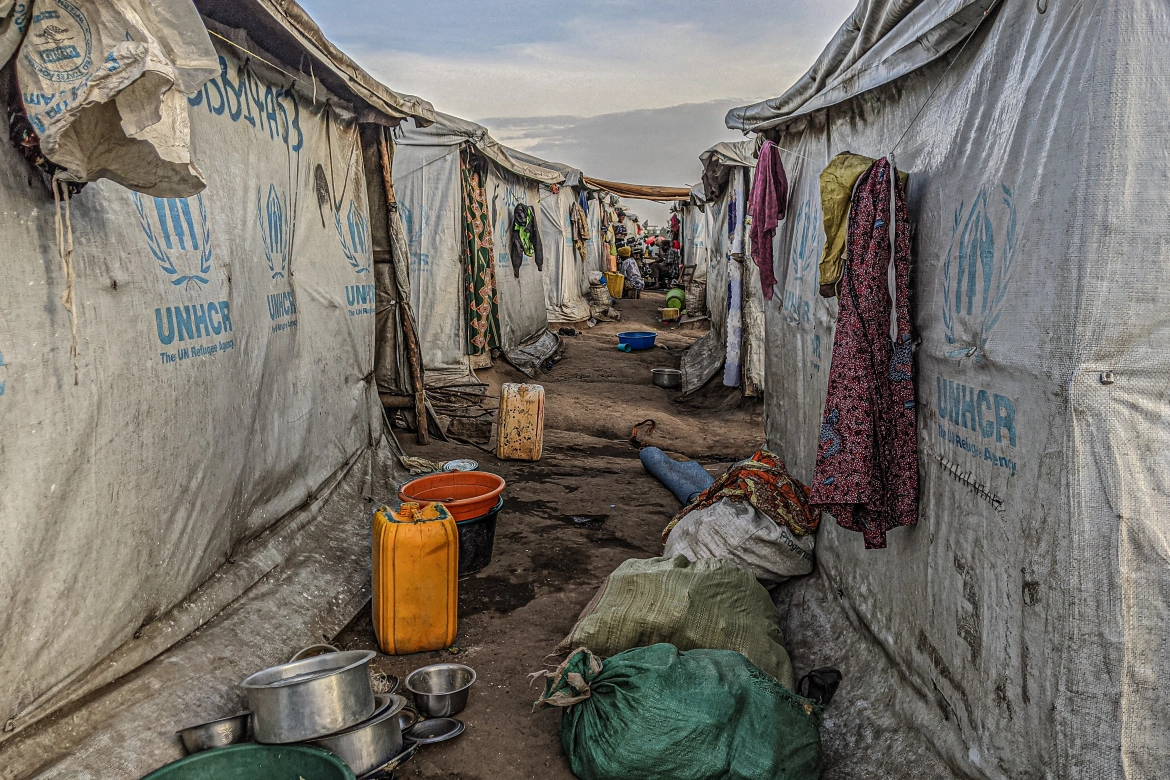Displaced people learn DIY skills in DR Congo camp

In March 2019, Pirache Torashi, a widowed mother of seven, fled the village of Banyali-kilo, 38km (23 miles) from the town of Bunia, the provincial capital of Ituri, in the Democratic Republic of the Congo’s east, following the war that started as she left her taro field.
Local residents say the attack was carried out by the armed group known as CODECO, which is active in several territories in Ituri province. After a long night’s walk from the village, she got to the Kigonze camp for Internally Displaced People (IDP) along with her children.
Kigonze camp, located two kilometres (1.2 miles) outside Bunia, is home to 20,000 displaced people, all of whom have fled several attacks by various militias across Ituri and, on a larger scale, in the eastern region.
According to a November 2021 report by UN Refugee Agency (UNHCR), 5.6 million people have been displaced in DR Congo despite measures to combat violence including a state of emergency declared last May. And in Ituri province, IDP camps have been attacked by rebels, resulting in 94 deaths last February alone.
“Thousands of families have fled to IDP sites to escape rebel attacks in their villages, but unfortunately they have been attacked even in IDP sites. It is horrible,” Dénis Oulai, head of the UNHCR office in Ituri, told Al Jazeera. “The solution to avoid attacks on IDP sites is to strengthen advocacy with the Congolese government to reinforce security issues around the sites and in the IDP site.
Some of those displaced from other camps have also come to Kigonze, where the residents are now learning new skills like soap making and tailoring to prepare them for a life of self-sufficiency.
Torashi who has lost her husband and two children to the conflict, said UNHCR officials are teaching her how to make soap that she can sell outside the camp to support her family.
“In this IDP site, life is not easy,” she told Al Jazeera. “We have so many problems, especially feeding our children. Some time ago, we wanted to leave the site to work in town and try to earn a dollar a day. UNHCR helped us not to leave and not to suffer outside the camp.” “This work in the camp keeps me busy and I don’t have time to go begging outside the camp to support my children despite the fact that I am displaced without a good job,” Torashi added.
According to UNHCR, the needs of the displaced are enormous and funding is low, so it is pressing ahead with helping the displaced become more self-reliant rather than wait for external funding.
Local residents say the attack was carried out by the armed group known as CODECO, which is active in several territories in Ituri province. After a long night’s walk from the village, she got to the Kigonze camp for Internally Displaced People (IDP) along with her children.
Kigonze camp, located two kilometres (1.2 miles) outside Bunia, is home to 20,000 displaced people, all of whom have fled several attacks by various militias across Ituri and, on a larger scale, in the eastern region.
According to a November 2021 report by UN Refugee Agency (UNHCR), 5.6 million people have been displaced in DR Congo despite measures to combat violence including a state of emergency declared last May. And in Ituri province, IDP camps have been attacked by rebels, resulting in 94 deaths last February alone.
“Thousands of families have fled to IDP sites to escape rebel attacks in their villages, but unfortunately they have been attacked even in IDP sites. It is horrible,” Dénis Oulai, head of the UNHCR office in Ituri, told Al Jazeera. “The solution to avoid attacks on IDP sites is to strengthen advocacy with the Congolese government to reinforce security issues around the sites and in the IDP site.
Some of those displaced from other camps have also come to Kigonze, where the residents are now learning new skills like soap making and tailoring to prepare them for a life of self-sufficiency.
Torashi who has lost her husband and two children to the conflict, said UNHCR officials are teaching her how to make soap that she can sell outside the camp to support her family.
“In this IDP site, life is not easy,” she told Al Jazeera. “We have so many problems, especially feeding our children. Some time ago, we wanted to leave the site to work in town and try to earn a dollar a day. UNHCR helped us not to leave and not to suffer outside the camp.” “This work in the camp keeps me busy and I don’t have time to go begging outside the camp to support my children despite the fact that I am displaced without a good job,” Torashi added.
According to UNHCR, the needs of the displaced are enormous and funding is low, so it is pressing ahead with helping the displaced become more self-reliant rather than wait for external funding.
Source: www.aljazeera.com
